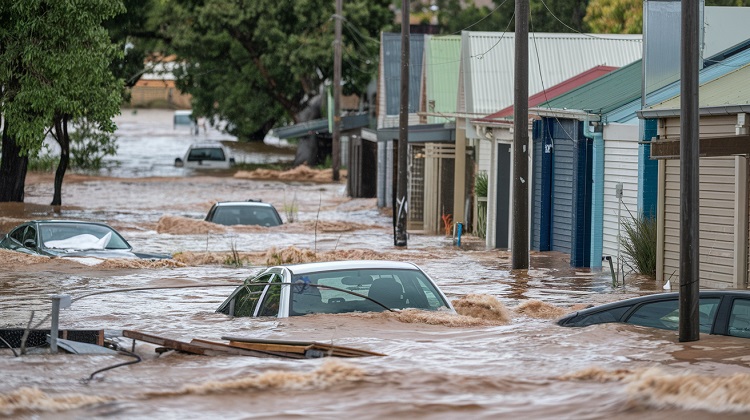The U.S. has reportedly asked Australia to send a warship to the Middle East where a number of commercial vessels are coming under fire in the Red Sea.
Australian Warship Deployment Requested Amid Rising Attacks in Red Sea
The US Navy has requested the Australian government to deploy a warship to the Red Sea, in response to a surge in attacks on vessels attributed to Iran-backed military forces.
As tensions continue to escalate in the Middle East, the Australian government is considering the deployment, which would involve Australian soldiers potentially responding to attacks.
The dangerous environment for international ships navigating the area has raised concerns, with recent incidents highlighting the volatile nature of the situation. Furthermore, the presence of Hezbollah on Israel’s border further complicates the security landscape.
In the midst of these developments, a joint statement by Australian, Canadian, and New Zealand leaders has called for a sustainable ceasefire in the Gaza Strip, expressing condolences to affected families and condemning Hamas terror attacks.
Key Takeaways
- The US Navy has requested the Australian government to deploy a warship to the Middle East for support due to ongoing attacks on vessels by Iran-backed military.
- The Australian government is reportedly considering the deployment, which could potentially require Australian soldiers to return fire if attacked.
- There have been multiple attacks on vessels in the Red Sea, including the storming of a cargo ship by Houthi rebels and the targeting of commercial ships and a Norwegian tanker.
- The involvement of Hezbollah on Israel’s border adds to the tensions in the region and poses additional security risks.
Request for Australian Warship Deployment
The US Navy has requested the deployment of an Australian warship to the Middle East for support in response to ongoing attacks on vessels by Iran-backed military. The request comes as tensions continue to rise in the region, with Houthi rebels targeting commercial ships in major shipping lanes and militants from Yemen launching missiles and drones.
The Australian government is reportedly considering the deployment, which could potentially require Australian soldiers to return fire if attacked. The dangerous area for international ships remains a concern, and the presence of Hezbollah on Israel’s border further complicates the situation.
In light of these developments, the request for an Australian warship aims to bolster security and protect vital shipping routes in the Middle East.
Ongoing Attacks on Vessels
How frequently are vessels being attacked in the Red Sea? The Red Sea has witnessed a concerning increase in attacks on vessels in recent months. In November, Houthi rebels stormed a cargo ship, and earlier this month, three commercial ships in major shipping lanes were targeted.
In another incident, a Norwegian tanker was struck by a missile fired by militants from Yemen. The attacks have not been limited to shipping lanes, as the rebels have also launched missiles and drones, targeting Israel and other vessels.
Due to these ongoing attacks, international ships are being warned to avoid traveling to Israel and to respond to rebels when they communicate.
The situation in the Red Sea remains dangerous, with the potential for further attacks on vessels.
Houthi Rebels’ Targeting of Ships
As the Red Sea continues to witness a concerning increase in attacks on vessels, it is imperative to delve into the Houthi rebels’ targeting of ships. These Iran-backed militants have been responsible for several attacks in the region.
In November, they stormed a cargo ship, and earlier this month, three commercial ships in major shipping lanes were targeted. The Houthi rebels have also launched missiles and drones, not only targeting vessels but also Israel. In fact, a Norwegian tanker in the Red Sea was struck by a missile fired by these militants from Yemen.
As a result of their actions, ships are being warned to avoid traveling to Israel and to respond when the rebels communicate. The Houthi rebels’ targeting of ships has become a major concern for international maritime security in the Red Sea.
Concerns About International Shipping Safety
Numerous concerns arise regarding the safety of international shipping in the Red Sea due to the escalating attacks on vessels by Iran-backed militants and the ongoing conflict involving Hezbollah on Israel’s border.
The attacks on commercial ships by Iran-backed Houthi rebels have become a significant threat to maritime security in the region. In recent months, several vessels, including a cargo ship and a Norwegian tanker, have been targeted by militants using missiles and drones.
The presence of Hezbollah fighters on Israel’s border further complicates the situation, adding to the risks faced by international shipping. As a result, there is a growing need for increased security measures and international cooperation to ensure the safety of ships navigating through the Red Sea.
Hezbollah’s Involvement on Israel’s Border
Hezbollah’s participation on Israel’s border further complicates the security situation in the region. The involvement of Lebanon’s Hezbollah in the fighting adds an additional layer of tension and risk. The conflict extends beyond the Israel-Hamas conflict, highlighting the complex dynamics at play.
Hezbollah, a Shiite Islamist political and military organization, has long been a key player in the region, with strong ties to Iran. Its presence poses significant security risks, as it has a history of engaging in acts of terrorism and destabilizing the region.
The ongoing clashes on Israel’s border with Hezbollah fighters only serve to heighten the already volatile situation. It is crucial for all parties involved to find a peaceful resolution to avoid further escalation and potential regional instability.
UN General Assembly’s Ceasefire Resolution
With three-quarters of the UN General Assembly voting in favor, a humanitarian ceasefire resolution was passed regarding the Gaza conflict. The resolution demands compliance with international humanitarian law and the release of hostages. However, it is important to note that the resolution is not legally binding.
Ten countries, including the United States, voted against the resolution, while twenty-three countries, including the United Kingdom, abstained from the ballot.
The passing of this resolution is a significant step towards achieving a sustainable ceasefire in the Gaza Strip. It reflects the international community’s concern for the humanitarian crisis and the need to protect innocent civilians caught in the crossfire. The resolution also emphasizes the importance of respecting international humanitarian law and calls for an end to the violence and hostilities in the region.
Joint Statement by Australian, Canadian, and New Zealand Leaders
The leaders of Australia, Canada, and New Zealand have jointly issued a statement expressing their support for a sustainable ceasefire in the Gaza Strip. In the statement, they conveyed their condolences to all families affected by the violence and condemned the terror attacks carried out by Hamas.
The leaders also emphasized the importance of Israel’s right to defend itself while adhering to international humanitarian law. They further advocated for the release of hostages held by Hamas and expressed their opposition to the forcible displacement of Palestinians.
Additionally, the joint statement highlighted their support for the Palestinians’ right to self-determination. By issuing this statement, the leaders of Australia, Canada, and New Zealand aim to contribute to the ongoing efforts for peace and stability in the region.
Support for Sustainable Ceasefire and Humanitarian Efforts
International leaders are advocating for a sustainable ceasefire and increased humanitarian efforts in the Gaza Strip. In a joint statement, leaders from Australia, Canada, and New Zealand expressed their support for a lasting ceasefire that would bring an end to the violence and suffering in the region. They called for all parties involved to respect international humanitarian law and work towards a peaceful resolution.
The leaders also emphasized the need for increased humanitarian aid to address the urgent needs of the affected population. They condemned the use of terror attacks by Hamas and called for the immediate release of hostages.
Additionally, the leaders affirmed their support for the Palestinians’ right to self-determination and expressed their opposition to the forcible displacement of Palestinians. They urged the international community to unite in efforts to achieve a sustainable ceasefire and provide much-needed humanitarian assistance to those affected by the conflict.
Albion News is a great place to find informative, up-to-date news articles. We provide a wide range of unique articles that offer an interesting perspective on current events from around the world and from various different sources. You can easily search for the topics that matter most to you and explore in-depth pieces that provide insight into the issues and important debates occurring today. Albion News helps you stay informed with carefully researched and credible stories!







